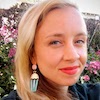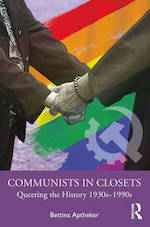GRAD NEWS | UNDERGRAD NEWS | FACULTY NEWS| ALUMNI SPOTLIGHT | EVENTS | OPPORTUNITIES & DEADLINES
CHAIR’S LETTER: Fall 2022
Dear Feminist Studies Community,
Welcome to the Fall 2022 quarter! We look forward to seeing many of you as we slowly ease our way back to in-person classes and a (hopefully soon) post-Covid reality. We look forward to many new opportunities for collaboration during the coming academic year.
Before addressing the exciting news that Feminist Studies is happy to share, it is important to acknowledge the many challenges the world faces today. Our thoughts are with the people of Pakistan, who are experiencing devastating floods; with the people of Ukraine, defending their homeland against an illegal invasion; with the people of Afghanistan, whose lives are in turmoil and danger; and with the people of many African and Middle Eastern countries facing hunger, drought, political and humanitarian crises. It is impossible to list all the difficulties around the globe, but these examples underscore the importance and urgency of engaging with the world from feminist perspectives to actively seek solutions to ongoing problems.
FMST at UCSC remains committed to this objective and will continue to engage deeply with global concerns, both within and beyond the U.S.
For example, Professor Felicity Schaeffer has been working with the Center for Innovations in Teaching and Learning to create a core course for the NEH-funded Humanizing Technology Certificate Program (HTCP), which “encourages students to explore the impacts of new and existing technologies… to develop critical thinking about social and cultural systems that inform these technologies, and provides them with tools for becoming socially responsible professionals.” Professor Schaeffer’s course will bring a feminist lens to the intersection of race, science and technology.
We are also excited to welcome Professor Amy Krauss to the Department! A cultural anthropologist by training, Professor Krauss will be teaching courses that focus, among other topics, on reproductive social justice and feminist jurisprudence, as well as decolonial feminist studies of science, technology, and medicine. Her research draws on ethnographic inquiry and participatory action research with activists, community organizers and healthcare practitioners in Mexico, Latin America and the U.S. who work with and advocate for women’s reproductive rights.
At the Divisional level, we extend congratulations to Professor Gina Dent, who has been appointed the inaugural Associate Dean of Diversity, Equity and Inclusion. This is an important commitment from Humanities to improve faculty and staff hiring and employment practices; improve student success, close equity gaps, and support the development of an inclusive curriculum; and overall increase a climate of belonging.
We are also excited to announce two book launch events this fall. On October 25, we celebrate Distinguished Professor Emerita Bettina Aptheker’s new book, Communists in Closets: Queering the History 1930s–1990s. On November 17, Professor Felicity Schaeffer will discuss her recently published book, Unsettled Borders: The Militarized Science of Surveillance on Sacred Indigenous Land. Learn more about these event in the newsletter, and mark your calendar to join us!
Finally, big kudos to three FMST grad students who successfully defended their dissertations and are now brand new PhDs: Claire Urbanski, Dana Theresa Ahern, and Halima Kazem-Stojanovic. Completing a dissertation is a tremendous accomplishment, reflecting years of study, extensive research, and self-discipline; completing such a project during the pandemic is an extraordinary accomplishment, worthy of extraordinary recognition. Congratulations, Claire, Dana and Halima! We wish you all the best on the next legs of your academic and professional journeys.
In closing, we anticipate another year of exciting guest speakers, so please keep an eye out for announcements. Welcome to the 2022-2023 academic year!
Zsuzsi Abrams
Interim Chair, Feminist Studies / Professor, Languages & Applied Linguistics, UCSC
GRADUATE STUDENT NEWS
Congratulations to our newest cohort of FMST PhDs!
2022 was a banner year for the UCSC Feminist Studies PhD program. Congratulations to the following grad students who successfully argued their theses and earned their PhDs:
Dana Ahern
Dissertation: Dangerous If Left Untreated: The construction and production of the transgender body
Dissertation committee: Felicity Schaeffer, Neda Atanasoski, Nick Mitchell, Christoph Hanssmann
Dana is now in Reno, NV, doing a two-year Postdoctoral Teaching Fellowship in Queer/Trans Studies in the Department of Gender, Race, and Identity at the University of Nevada. His research explores the emergence and consolidation of transgender medicine within a history of U.S. racial science and imperial warfare. Dana is also interested in queer and trans pedagogies, digital organizing and histories of queer and trans lives in Eastern Europe.
 Halima Kazem-Stojanovic
Halima Kazem-Stojanovic
Dissertation: Resisting Erasure: A Feminist History of Politics, Gender, and Empire in Afghanistan
Dissertation committee: Co-chairs Bettina Aptheker and Madhavi Murty, and Neda Atanasoski
Halima was awarded a UCSC Chancellor's Post-Doctoral Fellowship. Starting this September, she will be working with Professors Shelley Stamp and Jennifer Maytorena Taylor in Film and Digital Media to create an oral histories archive on Afghanistan with a special focus on women and ethnic minorities. Halima also holds an M.A. in Business and Economic Journalism from New York University. From 2012-2022, she was a journalism and human rights lecturer at San Jose State University. Before entering academia, she spent 17 years as a journalist and filmmaker, including a decade reporting on Afghanistan's war and rebuilding efforts, with articles published in the Los Angeles Times, The Guardian, and Al Jazeera. She is the co-producer of Frontrunner, a documentary chronicling the campaign of the first female presidential candidate in Afghanistan.
 Claire Urbanski
Claire Urbanski
Dissertation: Spiritual Conquest: Desecration and Settler Colonial Extraction on Sacred and Stolen Lands
Dissertation committee: Felicity Schaeffer, Neda Atanasoski, Nick Mitchell, Amy Lonetree, Renya Ramirez
Claire will be at Stanford University for the next two years as a postdoctoral research fellow with the Clayman Institute for Gender Research.
More FMST grad student achievements
Jess Fournier received the 2022 Bettina Aptheker Award for Research on Sexual, Gendered, and Racial Violence.
UNDERGRADUATE STUDENT NEWS
FMST welcomes new social media intern: Aaliyah Balangue
 Aaliyah Balangue (she/her) is our new social media intern for 2022-23! Aaliyah is a FMST and Global and Community Health double major. She is passionate about social justice, journaling, and reading about the human mind. We are so glad to have you join us, Aaliyah!
Aaliyah Balangue (she/her) is our new social media intern for 2022-23! Aaliyah is a FMST and Global and Community Health double major. She is passionate about social justice, journaling, and reading about the human mind. We are so glad to have you join us, Aaliyah!
Follow our FMST Instagram and other social platforms to keep on top of FMST news and events! And feedback is always welcome. Comment and let us know what you think!
Wanted: FMST Undergrad Student Rep and Event Coordinator!
The FMST Department has just created a new, paid position: Undergraduate Student Representative / Event Host & Coordinator! This job was developed in consultation with Yali Bitan, last year’s FMST UG Student Rep, who provided vital feedback and critiques around student needs and how best to serve them.
Working with Advisor Anne Eickelberg, the Undergrad Rep will act as liaison between FMST faculty and students; poll students to understand their issues and concerns; and organize meet-ups, study sessions, and other FMST events throughout the year.
The FMST department is very excited about this new position, and hopes that it can foster collaboration, community, and communication between FMST majors and between students, faculty, and staff, as well as help promote and build awareness of FMST throughout UCSC. Log in here to see the full job description and apply!
Broaden your FMST Education with Internships and Study Abroad Classes
Did you know you can earn credit for hands-on internships and international classes offered at colleges around the globe?
FMST majors can get real-world experience and earn credit toward one of seven required upper-division electives with an approved internship. Make progress toward your degree and contribute your labor to an organization you’re passionate about … maybe the UCSC Women’s Center, the California Coalition for Rural Housing, or NARAL Pro Choice California. See the approved list and step-by-step instructions here.
You can also deepen your feminist education by studying in-situ around the world, from Botswana to Brazil. Students can use up to three approved Study Abroad courses to fulfill Feminist Studies upper-division elective requirements. Learn more and check out the list of FMST-approved international classes here.
If you want to learn more about studying abroad, UCSC Global Learning is hosting an Opportunities Fair on October 19 – see details in the Events section of this newsletter. And stay tuned for info coming soon about a FMST-specific Study Abroad workshop we’re planning for later in the Fall quarter!
Feminist Undergrads recognized as Humanities scholars
Congratulations to FMST undergrads who were honored during the 2022 Humanities Spring Awards ceremony:
Ronald Gunna, double major in FMST and CRES, received the 2022 Sabrina Greenfield Memorial Award.
Maria Hele, double major in FMST and CRES, received the Spring 2022 Jay Family Humanities Scholarship Award.
Marcella Prado, a Pre-med double major in FMST and Education, received the 2022 David A. Kadish Humanities Scholarship.
FACULTY NEWS
Introducing Visiting Assistant Professor Amy Krauss
 The Feminist Studies department is very pleased to welcome Amy Krauss as Visiting Assistant Professor. Professor Krauss comes to UCSC from the London School of Economics and Political Science, where she was a Visiting Fellow in the Latin American and Caribbean Centre.
The Feminist Studies department is very pleased to welcome Amy Krauss as Visiting Assistant Professor. Professor Krauss comes to UCSC from the London School of Economics and Political Science, where she was a Visiting Fellow in the Latin American and Caribbean Centre.
Dr. Krauss holds a PhD from the Department of Anthropology at Johns Hopkins University. Prior to joining FMST at UCSC, she held Postdoctoral Teaching Fellowships at Princeton University and the University of Chicago. She has taught courses on topics including the politics of ethnographic inquiry and evidence in global health, critical histories of human rights and humanitarianism, feminist theories of justice, and activist research methods. Her writing has been published or is forthcoming in South Atlantic Quarterly, American Anthropologist, Revista Direito GV, Feminist Theory, and Medical Anthropology: Cross-Cultural Studies in Health and Illness.
Amy is a cultural anthropologist whose research and teaching interests span questions of law, inequality and state-making; decolonial feminist studies of science, technology, and medicine; relationality and embodiment; and reproductive ethics and politics. Her ethnographic inquiries and writing are grounded in participatory action research with feminist activists, community organizers and healthcare practitioners in Mexico, Latin America and the U.S.
Amy is currently finishing her first book, Friendship as Disobedience: Abortion Law and the Politics of Accompaniment in Mexico. Drawing on over a decade of collaborative ethnography with abortion care activists and doulas (acompañantes) in Mexico City, where abortion was legalized in 2008 and further criminalized in other states, the book traces how people seeking to end pregnancy navigate conflicting laws and the political bonds of resistance and solidarity that emerge in the process. Whereas global health policy discussions tend to focus on maternal mortality and morbidity rates associated with criminalized abortion, and now, centrally, with the efficacy of terminating pregnancy with pharmaceuticals, Friendship as Disobedience introduces an adjacent set of questions about feminist accompaniment as a counter-worldmaking praxis. Rather than position the Mexico City legal abortion program as an exemplar of progress—or indeed, a sanctuary, the book critically interrogates the production of new border regimes and the entanglement of reproductive rights with emergent and recursive forms of gendered and racialized inequality and punishment. Working with people doing and depending on cross-border accompaniment, the book traces a feminist practice that might not appear within formal appraisals of political action, but that nevertheless erupts, is dreamt of and longed for, and contributes to an archive of alternative visions of reproductive justice.
As a Visiting Professor, Amy will bring perspectives on law, legal theory, comparative law, Critical Race Theory and transitional justice to round out and enrich the Feminist Studies curriculum for the next two years. Planned courses include topics such as reproductive justice, feminist jurisprudence and perspectives on feminism and the law. Both undergraduate and graduate students will have the opportunity to work with Amy in the VAP position and to learn from her research and expertise.
Welcome, Professor Krauss!
FMST Faculty Promotions!
Congratulations to Jenny Kelly and Madhavi Murty, who were promoted in May to Associate Professor, and to Anjali Arondekar, who is now a full Professor!
“These promotions are well-deserved recognition for the hard work, outstanding scholarship and dedicated teaching of our FMST faculty,” said FMST Chair, Professor Zsuzsi Abrams, “as well as the immense contributions that Anjali, Madhavi and Jenny make to the Feminist department and our campus community.”
FMST Professor Gina Dent named inaugural Associate Humanities Dean of Diversity, Equity, and Inclusion
Humanities Dean Jasmine Alinder recently announced that Gina Dent has been named the inaugural Associate Dean of Diversity, Equity, and Inclusion. In her new role, Gina will work with divisional and department staff, as well as counterparts on campus and across the UC system, to develop and implement strategies to improve student success, close equity gaps, and support the development of an inclusive curriculum.
Gina Dent is Associate Professor of Feminist Studies, History of Consciousness, and Legal Studies. She received the Dizikes Faculty Teaching Award in the Humanities in 2019 and the Chancellor’s Achievement Award for Diversity in 2007. She has served on six Senate committees and has chaired four of them, including the Committee on Affirmative Action and Diversity [CAAD]. She conducted the campus’ first climate study of diversity, co-sponsored by the Chancellor’s Office and CAAD; and served as the inaugural Senate Equity Advocate (2021-22). Gina has a decades-long relationship to the UC President’s Postdoctoral Fellowship Program and served as Chair of the Advisory Committee and UCSC campus representative, as well as Chair (or Co-chair) of the program’s Arts & Humanities review panel. Currently, she is PI and Co-Director of the Visualizing Abolition project and a Faculty Fellow at the UCSC Institute of the Arts and Sciences. She is the editor of Black Popular Culture (The New Press, 1998) and co-author of Abolition. Feminism. Now. (Haymarket Books, 2022).
Congratulations to Gina as she steps into this very important new position.
FMST Distinguished Professor Emerita Bettina Aptheker celebrates publication of new book
 Beloved FMST Professor Bettina Aptheker’s newest book – Communists in Closets: Queering the History, 1930s-1990s – was published September 9 by Routledge Press. Professor Aptheker will discuss the book at a public event on October 25. (See info in the Events section of this newsletter.)
Beloved FMST Professor Bettina Aptheker’s newest book – Communists in Closets: Queering the History, 1930s-1990s – was published September 9 by Routledge Press. Professor Aptheker will discuss the book at a public event on October 25. (See info in the Events section of this newsletter.)
Communists in Closets explores the history of gay, lesbian, and non-heterosexual people in the U.S. Communist Party. Beginning in 1938, the Communist Party arty banned lesbian, gay, bisexual, and transgender people from membership, casting them off as "degenerates." This policy persisted until 1991. During this 60-year ban, gays and lesbians in the Communist Party were deeply closeted both within the party, and in their public lives as both queer and Communist. By the late 1930s, U.S. membership in the Communist Party approached 100,000, and tens of thousands more people moved in its orbit through the Popular Front against fascism; anti-racist organizing, especially in the south; and the Party’s widely read cultural magazine, The New Masses. Based on a decade of archival research, correspondence, and interviews, Bettina Aptheker explores this history, also pulling from her own experience as a closeted lesbian in the Communist Party in the 1960s and ‘70s. Ironically, and in spite of this homophobia, individual Communists laid some of the political and theoretical foundations for lesbian and gay liberation and women’s liberation, and contributed significantly to peace, social justice, civil rights, and Black and Latinx liberation movements.
Professor Aptheker’s earlier books include Intimate Politics: How I Grew Up Red, Fought for Free Speech and Became A Feminist Rebel (2006); and The Morning Breaks: The Trial of Angela Davis (1976; second edition 1999).
FMST Faculty Awards, Publications, and Conferences
Bettina Aptheker was interviewed on September 1st by Spiegel TV, a German station affiliated with Der Spiegel, for an upcoming documentary on the 1960s and ‘70s movements for peace, anti-racism, and social justice.
Bettina also tells us that her online course on Feminism & Social Justice, launched in March 2019 on Coursera in conjunction with the UCSC MOOC initiative, recently topped 96,000 students, logging on from countries all around the world!
Jenny Kelly received a Faculty Public Humanities, Digital, and Community-Engaged Research Fellowship (2022-2023), for Detours: A Decolonial Guide to Palestine (co-edited volume with Somdeep Sen and Lila Sharif), from the UCSC Humanities Division and The Humanities Institute.
Prof. Kelly also was busy through Spring and Summer:
Invited book talk: “Invited to Witness: Solidarity Tourism across Occupied Palestine,” Slugs & Steins: Lectures from UC Santa Cruz, June 2022.
Q&A: “Touring the Colonial Present and Imagining a Decolonized Future,” featured April 8 as part of the THI Imagination Series. Read it here.
Invited roundtable participant: “Queer Unsettlings: Geographies, Sovereignties,” Association for Asian American Studies Annual Meeting, April, 2022.
Invited roundtable participant: “The Detours Guide Series: Decolonization in Asia and Beyond,” Association for Asian Studies, Honolulu, Hawai’i, March, 2022.
Amy Krauss participated in a “A Question of Life: Human Dignity, Reproductive Rights, and Abortion Politics,” a virtual event presented December 11, 2021 by Global Observatory. The recorded discussions can be accessed here. Panelists from this event will reconvene in Fall 2022 to share reflections on the overturning of Roe v. Wade with the Dobbs decision, with the discussion to be published on the Global Observatory website.
Madhavi Murty contributed an essay, "Mentoring at the Boundary: Interdisciplinarity and the International Student of Color in Communication," in the Forum section of Communication, Culture and Critique in December 2021. The Forum, entitled "Prying the Doors Open: Women of Color Mentoring in the Field of Communication," recently won an APEX award, an annual award for "publication excellence," in the category of magazines, journals and tabloids - electronic.
Felicity Schaeffer discussed the process of researching and writing her new book, Unsettled Borders: The Science of Militarized Surveillance on Sacred Indigenous Land, in a recent THI profile. Read the article here.
Gina Athena Ulysse received a 2021-22 COT Excellence in Teaching Award from the UCSC Committee on Teaching in recognition of her contributions to outstanding course pedagogy and student experience at UCSC.
ALUMNI SPOTLIGHT – Five Questions with a Feminist
 Daisy Orellana, Class of 2019 - Abortion Doula, DuPont Clinic
Daisy Orellana, Class of 2019 - Abortion Doula, DuPont Clinic
The Five Questions with a Feminist interview series spotlights FMST alums who have gone on to do great things. Visit our YouTube channel to view the interview that incoming Visiting Assistant Professor Amy Krauss did with Daisy Orellana, Class of 2019. Below is an edited version of their conversation.
Daisy Orellana graduated from UCSC in 2019 as a Feminist Studies major with a Science, Technology and Medical concentration. During her time at UCSC, Daisy did a UC Davis Study Abroad health internship in Oaxaca, Mexico, and also interned with ACCESS Reproductive Justice. After graduating, Daisy worked as an Abortion Fund Hotline operator at ACCESS RJ and as a Residential Counselor at Jelani House, a transitional housing program in San Francisco specialized in supporting pregnant and postpartum folks. In 2022, Daisy moved to Washington DC and is currently working as an abortion doula at DuPont Clinic. Ultimately, she hopes to return to the Bay Area to study midwifery.
Hi Daisy. Can you tell us about your current day-to-day work as an abortion doula?
I work at DuPont Clinic, one of only four clinics in the U.S. that offers third trimester abortion care. I’m a Patient Care Guide, more commonly known as an Abortion Doula. My goal with every patient is to be their support, emotionally, physically, mentally, and guide them through the process. For many people it’s a traumatic journey to get here. People get turned away for various reasons at the gestation that they are; there are so many barriers. So when folks come here, there’s a sigh of relief that they made it. When they’re here, everyone accepts them as they are. I ask, what can I do to make you comfortable and make this as positive an experience as possible, even though many folks really don’t want to be here.
On Day 1, they meet the whole team. It’s very private care; each patient gets their own room and doesn’t run into any other patients, which is atypical for an abortion clinic. We do the first part of the procedure, which is the injection, the first step in stopping the fetal heart rate. It can be a lot for some people, depending if it’s a desired pregnancy, if there’s an anomaly, or just because they’re scared of needles. I’m here to make the experience a little easier.
On Day 2, we do dilating to start opening up the cervix in a gentle way, and I try to make them as cozy as possible.
On Day 3, we induce labor. During that part, I provide comfort measures: backrubs, heating pads, medications. I demystify the procedure and help build trust between the patient and the providers in the clinic. I’m the main person providing continuity of care and stay with the patient all three days. In birth work, which I used to do, the nurses are in and out, and doctors are always changing shifts. It’s a special touch here and what drew me to this clinic – that model of consistent care.
How did your FMST major influence your career path?
I was drawn to classes in topics I didn’t know before. I entered UCSC as a biochemistry major, but my science classes weren’t enough. I wasn’t getting the perspective or the conversations that excited me. I knew that UCSC was known for feminism and sciences coursework, and that combination was exactly what I was looking for. Discussions about science, discussions about health, and more realistically about my lived experience and what I was seeing at home: the chronic illness of my mother, structural failures in the healthcare system. It’s not black and white and “objective;” I was interested in more analysis. I was encouraged when I sampled some GEs and really appreciated how the major is interdisciplinary. So I could apply a feminist lens to all my classes … the sociology of health and sciences, the sociology of drugs, botanicals and pharmaceuticals. I really appreciated that my vision for what I wanted to do and build my studies in these topics was made possible in the FMST department.
Are there ways your feminist studies coursework prepared you for what you’re doing now?
It gives me a better lens to understand what I’m witnessing, to help break it down and understand what structures are at play. For example, I used to work at a homeless shelter and I would get really upset about all the cameras in the rooms and the way we were handling all these policies in place. I felt my feminist studies helped me understand things like surveillance, how we control bodies, who is disproportionately represented in the shelter system and how invasion of other countries like Honduras and policies around not having documentation or good welfare all came into play with these services. I go a little crazy when I see all the awful stuff happening. And I bring that to my patients: What you’ve gone through in your journey to get to this abortion clinic is not normal. It’s not fair that you have to go through so much to get the funding to pay for this $15,000 procedure when you don’t have insurance. It’s not you or your moral failings. It’s our country’s policies of gender violence around folks who get pregnant. What you’re going through shouldn’t be normalized. I think my studies help me assess these situations.
What were your favorite FMST class or classes?
There was a summer session class, I think it was Critical Race and Queer Feminisms. I felt the specific lens we were using was close to me, as someone who identifies as queer and a person of color. And since gay marriage had become legal, I appreciated the discussions about what is marriage and the timeliness of the class. It was a more intimate class with fewer people since it was summer session.
What was the most important thing you learned as a Feminist Studies major?
I’m drawn to science and healthcare, but in those classes I wasn’t really taught to own my voice or form my own opinions and analysis. When I started taking humanities and social science classes in my second/third year, it was like, Whoa, I have opinions. I can look at something and analyze it: this is suggestive of this, this is telling of this, these are contradictions. I built that skill with time by looking at case studies and dissecting articles. Now I take that tool into my day-to-day. Sometimes I think what I’m witnessing in my clinic could be a book. I step back and think, Wow, I’m witnessing this clinic and third trimester care with the fall of Roe. That’s huge. I should be taking notes for an ethnography.
I would be really excited to read your reflections on that someday. Is there anything else you’d like to share with our Feminist Studies students?
I’d say explore all kinds of jobs. Since I graduated I’ve had six different jobs. You can do so much with the major. Don’t let go of what you learned in college when you enter the non-profit system. Non-profits can be hard. It’s really important to take your convictions, your values and your feminism into your job. It’s so valuable; don’t let it go. You can be an advocate and make a difference in a lot of people’s lives if you hold onto that.
FMST EVENTS AND OTHER EVENTS OF INTEREST
Book Talk & Celebration – Communists in Closets: Queering the History, 1930s-1990s, by Distinguished Professor Emerita Bettina Aptheker – October 25, 6 pm PT at the UCSC Hay Barn
Join beloved FMST Professor Bettina Aptheker as she talks about her newest book, Communists in Closets, which explores the history of gay, lesbian, and non-heterosexual people in the U.S. Communist Party. Co-sponsored by Bookshop Santa Cruz, The Humanities Institute, and Feminist Studies. Free and open to all.
Futures Lecture Series – Fall 2022
The UCSC Center for South Asian Studies presents this year-long lecture series, curated by FMST Professor Anjali Arondekar. All lectures are virtual, from 12 noon to 2pm PT. Visit csas.ucsc.edu/events to learn more.
- September 30 – The People Revolt: Sri Lanka – Panelists: Farzana Haniffa, Professor, Sociology, University of Colombo; Swasthika Arulingam, human rights lawyer and women’s rights activist; Marisa De Silva, feminist activist and coordinator for the People’s alliance for Right to Land (PARL). Register here.
- October 28 – Who Governs in India’s Small Towns? Notes from Rajasthan’s Nagar Palikas – Professor Tariq Tachil, University of Pennsylvania. Register here.
- November 18 – Climate Ledgers: Atmospheric Politics, Risk and Liability in the Indian Ocean, 1770-1850– Professor Debjani Bhattarcharyya, University of Zurich. Register here.
UCSC Global Learning Opportunities Fair – October 19, 10 am to 3pm in Quarry Plaza
Learn about opportunities for international study and talk with UCSC Study Abroad alums about their experiences. Meet the UCSC Global Learning team to get all your questions answered, including how financial aid applies to international programs. Sign up for event alerts here.
Opening Celebration for Kūkulu Art Exhibition, November 9, at Porter Koi Pond
The Kūkulu Art Exhibition – November 9 to 27 at the Porter College Sesnon Underground Gallery – is a traveling exhibit featuring art, music, and messages from the ongoing movement to protect the sacred mountain of Mauna Kea from the proposed Thirty Meter Telescope Project. The opening event will include a performance by the Kuhai Halau O Mehanakealohakalauaʻeikapoli Pa ʻOlapa Kahiko Hula group, and opening remarks from a representative of the Amah Mutsun Tribal Band. Co-sponsored by the Jack & Peggy Baskin Endowed Chair in Feminist Studies.
Book Talk & Celebration – Unsettled Borders: The Militarized Science of Surveillance on Sacred Indigenous Land, by Professor Felicity Schaeffer – November 17, 3pm PT, H1-rm 210 / Zoom link to come
Join FMST Professor Felicity Schaeffer for a discussion of her newest book, Unsettled Borders, which examines the ongoing settler colonial war over the US-Mexico border from the perspective of Apache, Tohono O’odham, and Maya who fight to protect their sacred land.
UPCOMING OPPORTUNITIES & DEADLINES
Pathways to Research – Deadline October 8
P2R is a research-mentoring program for EOP first-generation, low-income, and transfer undergraduate students majoring in a social science or humanities discipline. Over the program year, undergraduate mentees receive mentorship from a Ph.D. student on topics spanning the research process and graduate school preparation. Learn more about P2R here.
Koret Undergraduate Research Scholarship – Deadline October 17
Undergrads are invited to apply for this $2000 scholarship, open to students in any major and in every discipline who are looking for financial support to pursue a research question or creative activity in winter and/or spring 2023. This year, the Koret Foundation is able to offer 50 scholarships. In most cases, Koret Scholars work with their mentors in a 2 or 5 credit Independent Studies course. Find more details and the application here.
University of California President’s Postdoctoral Fellowship – November 1
The UC President’s Postdoctoral Fellowship Program was established in 1984 to encourage outstanding women and minority Ph.D. recipients whose research, teaching, and service will contribute to the diversity and equal opportunity at the UC. The current program offers postdoctoral research fellowships and faculty mentoring to outstanding scholars in all fields at any one of UC’s ten campuses. The award includes a salary starting at approximately $55,632, with health insurance and paid vacation/sick leave, and up to $5,000 for research-related and program travel expenses. Each award is for a minimum of 12-months and may be renewable for an additional term upon demonstration of academic/research productivity. More info and application here.
Mellon/ACLS Dissertation Innovation Fellowship – Deadline November 2
ACLS has discontinued the Mellon/ACLS Dissertation Completion Fellowship. This new fellowship is not a completion fellowship and requires a student to come back to the program for two years. The new program opens up opportunities for different kinds of work, as well as new mentorship opportunities. It still requires an institutional letter, which is usually provided by the Grad Division. More info here. ACLS will hold office hours on October 7, 13, and 21 to answer questions about the program. Contact Connie Zhang (conniezheng@ucsc.edu), the GSR for Research Development, if you'd like to be included in updates.
THI Undergraduate Public Fellows Program – October 7
THI Public Fellowships connect Humanities students to projects in the community, with the aim of mutually benefiting students and community organizations. There are currently two positions at the Santa Cruz MAH and THI will be uploading more fall opportunities soon. Find info here.
Practical Activism Conference Info Sessions – First class: October 17
Help plan the 20th Annual Practical Activism conference, to be held in Winter 2023, and earn 2 credits (and fulfill the PR GE, too!). Sign up for an info session here, and submit a PAC planning application here. Classes meet Mondays from 1:20-2:25, starting October 17.

